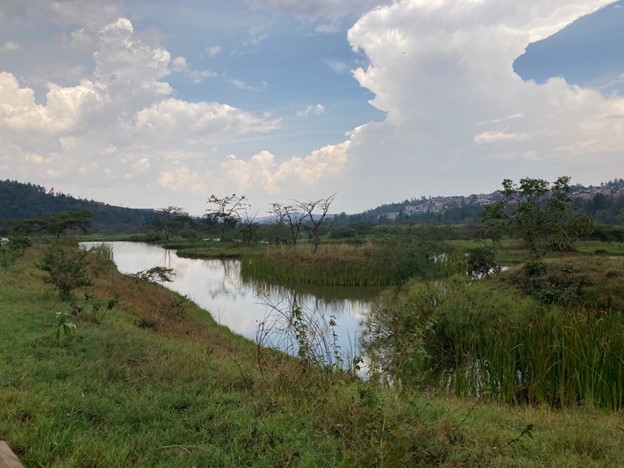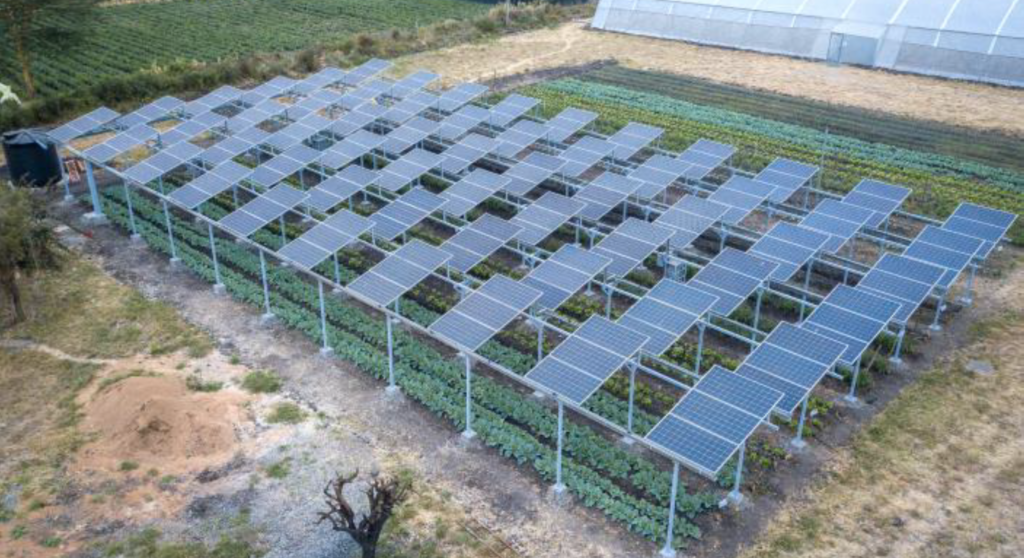Select language
Trends
Global NEWS
| Title | [GGGI] 2024 World Environment Day- How GGGI is supporting government of Rwanda to tackle land degredation |
|---|---|
|
This year’s World Environment Day is placing the spotlight on some of Africa’s most pressing challenges: land degradation, desertification, and drought. It is estimated that 45 percent of Africa’s population currently lives in drylands that are susceptible to desertification, a form of land degradation, and 40 million people already live in severe drought conditions[1]. In Rwanda, land degradation and soil erosion have long been identified as key challenges facing the country. According to estimates[2], roughly 15 million metric tons of soil is lost per year, which is equivalent to the capacity of land to feed 40,000 people annually. Rwanda is also highly dependent on its natural resources – such as land, forests, and water – for rural livelihoods and economic growth. Evidence suggests that land degradation is costing Rwanda an estimated 3.5% of agricultural GDP[3]. Rwanda is also experiencing an increase in the number of droughts, particularly in the Eastern province of the country, and this trend is likely to worsen amidst an accelerating climate crisis. Agriculture is particularly threatened by climate-induced drought as 98% of the sector is rain-fed. With agriculture representing more than 30% of Rwanda’s GDP and providing an occupational lifeline for more than 80% of the population, increased droughts could reverse decades of economic gains and developmental progress, if no action is taken.
Here are five strategies that GGGI is advancing to support Government of Rwanda to tackle land degradation and drought. 1. Effective implementation of the National Land Use plan and Development Master Plan and City Master Plans: Rwandan cities are currently growing on average at a staggering 3.2% rate per annum[4]. Much of this growth is inadequately managed, resulting in urban sprawl, which in turn is contributing to land degradation. Recognizing the need for green and climate resilient urban development, the Government of Rwanda has adopted severally policies, such as the National Land Use and Development Master Plan and the National Roadmap for Green Secondary City Development. At the district level, master plans for Kigali and six secondary cities (Huye, Muhanga, Musanze, Nyagatare, Rubavu and Rusizi) were revised in 2020, with support from GGGI. These revised plans placed strong emphasis on zoning guidelines that prioritize the protection of environmentally sensitive and high-risk zones, appropriate densification, design of robust and climate resilient infrastructure and incorporation of nature-based solutions (NbS). However, due to limited enforcement, encroachment into protective buffer zones, wetlands, and marsh lands continues unabated. Existing enforcement efforts rely heavily on institutional capacities, which are often limited. However, community-led enforcement mechanisms are increasingly proving effective. These mechanisms enhance residents’ ownership and empower them to contribute to their community’s resilience. When combined with digital tools like remote sensing, community-led enforcement allows for rapid monitoring and detection of dynamic changes in land use and land cover. Rwanda can also tap into opportunities provided by AI to improve monitoring of land use plan enforcement. 2.Promoting healthier soils through regenerative agriculture: regenerative agriculture, which encompasses both conservation agriculture and sustainable agroforestry practices, is critical to agricultural land restoration. Through techniques such as cover crops, reduced tillage, and crop rotation, farmers can increase soil nutrients and organic content, improving crop yields. These techniques also reduce the need for chemical fertilizers, ensuring long-term soil health, and improving water retention, thereby supporting soil stability. Despite the above benefits, adoption of regenerative agriculture remains limited. According to IUCN data, the dissemination of agroforestry practices stood at 2-4% in 2021. Although Rwanda has taken steps in the right direction, bolder action is needed to accelerate the transition towards regenerative agriculture. This can be achieved through awareness raising and capacity building of farmers to adopt such practices. Capacity strengthening targeting government entities such as Rwanda Forestry Authority and Rwanda Agriculture and Animal Resources Board is crucial to mainstream regenerative agriculture in extension services and support adoption at scale. Through collaborations with the Ministry of Education, regenerative agriculture can also be integrated in TVET curriculum. Furthermore, action should be taken to promote the production and adoption of organic fertilizer. As part of the Waste to Resources project implemented in partnership with Ministry of Environment, GGGI has established a 5 tons biowaste treatment plant at the Nduba dumpsite in Kigali to turn organic waste into compost. Leveraging this facility, further action can be taken to promote sorting at source and segregated waste collection and transportation which are critical to minimize contamination of organic waste and ensure high quality inputs for the biowaste treatment facility. Moreover, market development for organic fertilizer and capacity strengthening of key actors are equally important. 3.Piloting and scaling up agrivoltaics in Eastern Province: To tackle the challenges of prolonged dry spells and water stress facing crops in the Eastern province, GGGI, in partnership with the Ministry of Agriculture, is exploring the feasibility of agrivoltaics. Evidence shows that by placing crops under solar photovoltaic panels, agrivoltaics can create controlled shading and reduce evaporation, leading to increased crop yields. Agrivoltaics can also be designed to integrate with water-efficient irrigation systems, optimizing water usage. Moreover, the electricity generated can be used for improving access to electricity in the rural areas, irrigation requirements, and powering post-harvest facilities. This is critically important as Rwanda currently loses and wastes 40% of its food supply. Additionally, revenue generated from solar energy production can be invested in improved irrigation infrastructure and drought-tolerant seeds.
Figure 1 Agrivoltaics pilot in Kenya , Image courtesy of C. Lamannaand Chloride Exide Ltd. With abundant solar radiation across the Eastern province of Rwanda, the potential for photovoltaic electricity generation is significant. The terrain is also relatively flatter compared to the rest of the country, which is compatible with agrivoltaics. Evidence from GGGI’s preliminary study on the feasibility of agrivoltaics in Rwanda indicates the potential for climate adaptation for crops and renewable energy access in rural areas. Moreover, the analysis shows increased climate resilience and yield for French beans and recommends the implementation of a pilot project of 30-100 kWp to test additional crops such as beans, maize, potatoes and coffee, among others. Moreover, the power generation yield of the proposed first pilot is estimated at 153 MWh/year which has the potential to supply around 1,000 households. 4.Scale up restoration of wetlands: With close to 1,000 wetlands across the country, both protected and unprotected, Rwanda recognizes the critical role that wetlands play in the fight against climate change. Wetlands are not only the most effective carbon sinks on earth, but they are also critically important to water quality and availability. They serve as buffers against the catastrophic effects of extreme weather events by storing water in times of heavy rainfall and preserving surface water in times of drought. Rwanda is home to several wetlands of international importance, associated with major lakes such as Lake Cyohoha, Rweru, Mugesera, Nasho and rivers such as the Akagera River. However, most of these ecosystems are threatened by unsustainable agricultural practices and pollution. It is worth noting that only 3% of national wetlands are currently protected, including some that are RAMSAR sites. Whilst Rwanda has prioritized the protection and restoration of wetlands, there is a need to mobilize additional resources to avoid further degradation and scale up wetland restoration efforts. 
Figure 2 Nyandungu ecotourism park. Image courtesy of GGGI Rwanda Rwanda Environment Management Authority (REMA), with advisory support from GGGI, led the successful restoration of Nyandungu wetland in Kigali into an award-winning eco-tourism park. Building on this first success, efforts are currently underway to scale up restoration to five additional wetlands in the capital city. As part of a project funded by the Italian Ministry for Environment and Energy Transition, GGGI is providing advisory and technical support to mobilize additional resources for the wetland rehabilitation scale up effort. However, there is a need for similar efforts targeting wetlands outside Kigali which are facing severe degradation, particularly wetlands of international importance. The elaboration of a wetland management plan and guidelines for wise use of wetlands across the country is also a high priority. Additionally, investment in enhancing capacities of stakeholders, alongside stronger enforcement, are critical for preventing further degradation. 5. Centering communities, particularly women and youth, in restoration action: Rwanda, one of the earliest adopters of the Bonn Challenge, has gained significant recognition globally for its ambitious and committed action towards land restoration. Through a robust policy framework, coupled with annual mass planting drives, the country has been able to plant millions of trees annually. As a result, in 2019, Rwanda reached its target of 30% forest cover a year earlier than planned. Building on strong government action, there is an opportunity to further scale up and sustain land restoration efforts through enhanced partnerships with communities, particularly women and youth. This is in line with Government of Rwanda’s recent recognition of the need for more community-led restoration. 
Figure 3 Capacity building session delivered by GGGI at Kamonyi as part of the 2020 – 2023 GCF National Adaptation Plan (NAP) Readiness and Preparatory Support for Building Flood Resilience Capacity in Rwanda GGGI in collaboration with REMA, is implementing a Green Climate Fund (GCF) project to mainstream gender in climate issues, focusing on empowering rural women. Rural women, who constitute 52.1% of Rwanda’s population and head 29.9% of households, play a key role in climate actions such as establishing tree nurseries, tree planting, forestry management, and erosion control. It is crucial to enhance their awareness of their contributions to climate change adaptation and mitigation, and their role in achieving Nationally Determined Contributions (NDC) targets. Promoting gender integration and citizen participation is essential, particularly in rural areas where women and children are most affected by climate change. Meaningful participation of women in land restoration efforts could include designing specific mechanisms to involve women in the planning, implementation, and monitoring of restoration efforts. Equally important, youth should be systematically included in restoration efforts with an eye towards promoting income-generating activities and green jobs that can benefit them. Similarly, centering women and youth in land use management could yield significant results. Rwanda’s advancements in land governance have notably increased land rights for women and youth. The introduction of an electronic certificate system for land registration has ensured transparency and reduced disputes in land ownership processes. Although tenure security has been improved, the direct engagement of women and youth in land use management remains limited. With more women-headed households participating in urban development and agricultural investments, it is crucial to involve them to address their unique needs and concerns by leveraging the existing environmental committees at the district and sector level, ensuring equal representation of women and youth in the decision making.
Author: Caroline Raes, GGGI Rwanda Country Representative
[1] World Economic Forum report Quantifying the Impact of Climate Change on Human Health 2024. [2] IUCN Transforming Eastern Province through Adaptation (TREPA), Funding proposal, 2021. [3] L. Berry, J. Olson, and D. Campbell, 2003. Assessing the extent, cost and impact of land degradation at the national level: findings and lessons learned from seven pilot case studies. [4] Reshaping Urbanization in Rwanda, World Bank, 2017 [5] C. Lamannaand Chloride Exide Ltd., Accessed Aug. 2023 |
|
| View Original URL | View Original |
| Category | etc |
| File |
|
| Sources | 녹색성장연구소 |






